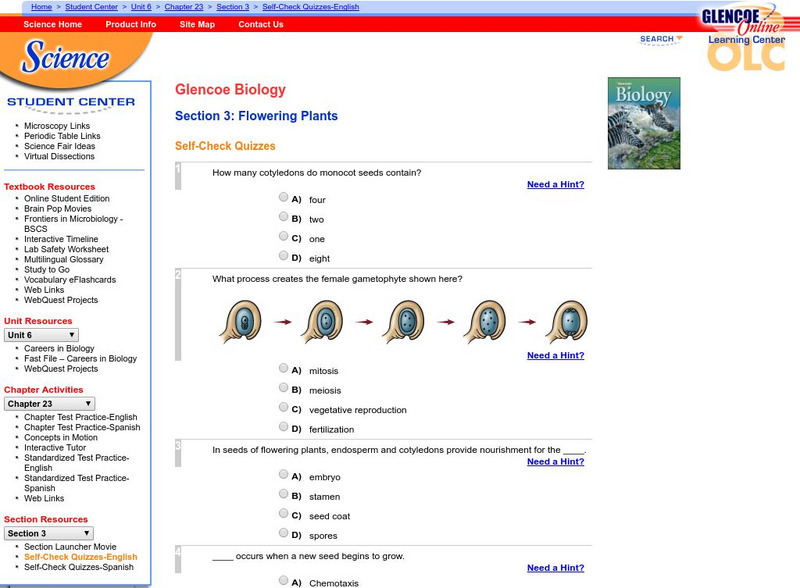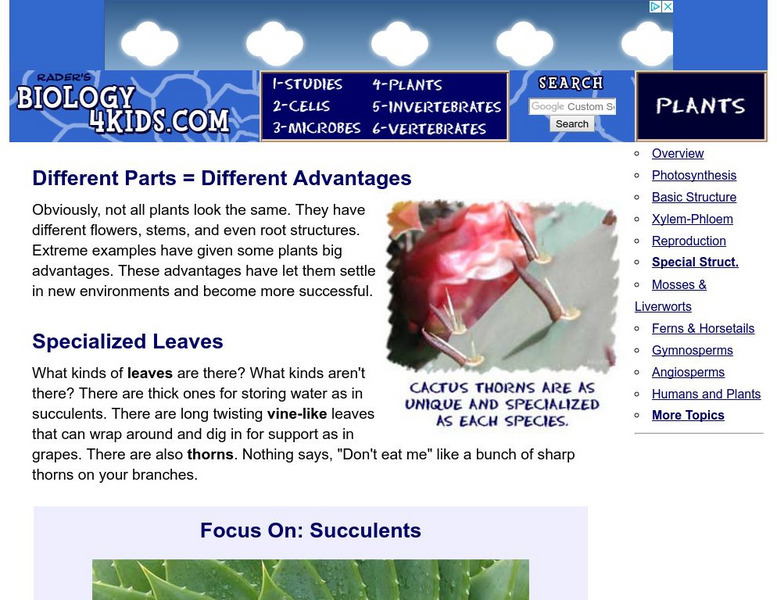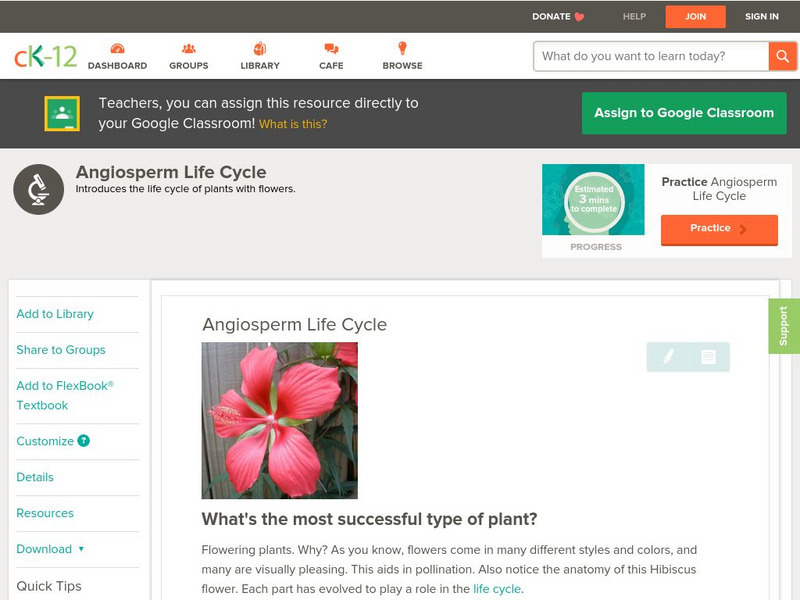E-learning for Kids
E Learning for Kids: Science: Iceland: Plants: What Parts Do Plants Have?
Explore Benny's garden, and he will show how plants and trees are built. Join him to to learn about basic plant parts.
E-learning for Kids
E Learning for Kids: Science: Norway: What Are the Functions of Different Parts of a Plant?
Heidi is going on a class trip with her class in Norway. Help her learn the functions of different parts of the plants found.
E-learning for Kids
E Learning for Kids: Science: Hawaii: What Happens in the Life Cycle of a Flowering Plant?
Sophie and Max are growing plants in their greenhouse. Join them, and learn about the life cycle of a plant.
Soft Schools
Soft Schools: Flower Anatomy
Identify the major parts of a flower. Select each part name and drop in the boxes next to the full-color diagram.
Estrella Mountain Community College
Online Biology Book: Flowering Plant Reproduction: Fertilization and Fruits
Microscopic images, detailed information, and illustrated diagrams help explain plant reproduction with a focus on fertilization.
Repeat After Us
Repeat After Us: Angels, in the Early Morning
A poem from Emily Dickinson, "Angels, in the Early Morning", is provided on this site. Students may listen to this poem read aloud by Scott Becker and can access a printable version of this piece.
Repeat After Us
Repeat After Us: As if Some Little Arctic Flower
A poem from Emily Dickinson, "As If Some Little Arctic Flower", is provided on this site. Students may listen to this poem read aloud by Mark Eckardt and can access a printable version of this piece.
Repeat After Us
Repeat After Us: Bloom Is Result to Meet
A poem from Emily Dickinson, "Bloom--is Result--to Meet", is provided on this site. Students may listen to this poem read aloud by Gary Bodwin and can access a printable version of this piece.
Repeat After Us
Repeat After Us: By Chivalries as Tiny
A poem from Emily Dickinson, "By Chivalries as Tiny", is provided on this site. Students may listen to this poem read aloud by Jeff Kiok and can access a printable version of this piece.
Repeat After Us
Repeat After Us: If I Should Cease to Bring a Rose
A poem from Emily Dickinson, "If I Should Cease to Bring a Rose", is provided on this site. Students may listen to this poem read aloud by Jeff Kiok and can access a printable version of this piece.
Repeat After Us
Repeat After Us: If She Had Been the Mistletoe
A poem from Emily Dickinson, "If She Had Been the Mistletoe", is provided on this site. Students may listen to this poem read aloud by Jocelyn Medawar and can access a printable version of this piece.
Repeat After Us
Repeat After Us: Perhaps You'd Like to Buy a Flower
A poem from Emily Dickinson, "Perhaps You'd Like to Buy a Flower", is provided on this site. Students may listen to this poem read aloud by Bobby Allen and can access a printable version of this piece.
University of California
University of California, Berkeley: Cal Photos: Plants
Need a photo for a project, report, multimedia presentation on plants from around the world as well as California? Find fair use images of specific plants by searching with the scientific name, common name, or location.
Other
Osteospermum.com
A beginner's guide to Osteospermum, commonly known as the African Daisy. Includes detailed information about varieties, propagation, and care, along with vivid photographs and helpful links.
Other
Wake Forest University: Angiosperms Reproduction/life Cycle
This informative resource describes the advances that angiosperms possess over conifers. It also looks at the parts of a flower, how fruit develops and the life cycle of an angiosperm.
McGraw Hill
Glencoe Biology: Flowering Plants: Self Check Quiz
Try these five multiple-choice questions about flowering plants. After submitting answers, students can review the material.
Other
Middle School Science: Flower Dissection [Pdf]
In this lab experiment site, you will learn the parts of the flower, compare male and female anatomy, determine if the male or female parts are longer and what advantage that might have in fertilization.
Scholastic
Scholastic: Study Jams! Science: Plants: Flowers
A video and a 7-question multiple-choice quiz on the structure and functions of flowers.
Biology 4 kids
Biology4 Kids: Different Parts = Different Advantages
A concise reference highlighting the specialized parts of plants and the jobs they do.
University of Illinois
University of Illinois Extension: Great Plant Escape: Flower Parts
Peruse this colorful site and discover the various part of a flower.
CK-12 Foundation
Ck 12: Biology: Angiosperm Life Cycle
[Free Registration/Login may be required to access all resource tools.] Discusses the life cycle of angiosperms.
Other
Backyard Nature: Flower Types Good to Know
Peruse this site of flowers galore! Read about bean flowers, buttercups, magnolias, grasses, pansies and more.
Cornell Lab of Ornithology
Habitat Network: Native Flowerbeds
Find out why flowering plants are foundational in the understory of a structurally diverse habitat.
CK-12 Foundation
Ck 12: Life Science: Angiosperms
[Free Registration/Login may be required to access all resource tools.] Angiosperms, in the phylum Anthophyta, are the most successful phylum of plants. Angiosperms evolved the structure of the flower, so they are also called the...
























